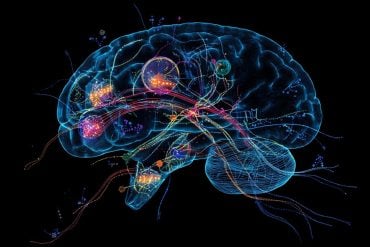Summary: Early-to-midlife infections that require hospital care are associated with an increased risk of developing Alzheimer’s and Parkinson’s disease later in life, a new study reports.
Source: PLOS
Infections treated with specialty hospital care in early- and mid-life are associated with an increased subsequent risk of Alzheimer’s (AD) and Parkinson’s diseases (PD), but not amyotrophic lateral sclerosis (ALS), according to a new study publishing September 15th in the open-access journal PLOS Medicine by Jiangwei Sun of Karolinska Institute, Sweden, and colleagues.
Experimental studies in animals have suggested that infection plays a role in the development of some neurodegenerative diseases, but supporting evidence in humans is limited.
In the new study, researchers used data on people diagnosed with AD, PD or ALS from 1970-2016 in Sweden, as well as five matched controls per case, all identified from the Swedish National Patient Register. The analysis included 291,941 AD cases, 103,919 PD cases and 10,161 ALS cases.

A hospital-treated infection 5 or more years before diagnosis was associated with a 16% higher risk of AD (95%CI: 1.15-1.18, P < 0.001) and a 4% higher risk of PD (95%CI: 1.02-1.06, P < 0.001), with similar risks seen for bacterial, viral and other infections and for different sites of infection.
The highest risk of disease was seen in people with multiple hospital-treated infections before the age of 40, with more than double the risk of AD (OR=2.62, 95%CI: 2.52-2.72, P < 0.001) and more than 40% increase in the risk of PD (OR=1.41, 95%CI: 1.29-1.53, 3 44 P < 0.001). No association was observed for ALS, regardless of age at diagnosis.
“These findings suggest that infectious events may be a trigger or amplifier of a pre-existing disease process, leading to clinical onset of neurodegenerative disease at a relatively early age,” the authors say, while also pointing out that “due to the observational nature of the study, these results do not formally prove a causal link.”
Sun adds, “Hospital-treated infections, especially in early- and mid-life, were associated with an increased risk of Alzheimer’s disease (AD) and Parkinson’s disease (PD), primarily among AD and PD cases diagnosed before 60 years.”
Funding: This study was supported by the Swedish Research Council (grants No: 2019-01088 (FF), 340-2013-5867 (FF), and 2017-02175 (KW)), the Joint Program on Neurodegenerative Diseases (JPND, grant number: 2021-00696 (FF)), and the Chinese Scholarship Council (JS). The funders had no role in study design, data collection and analysis, decision to publish, or preparation of the manuscript.
About this neurodegeneration research news
Author: Claire Turner
Source: PLOS
Contact: Claire Turner – PLOS
Image: The image is credited to Jiangwei Sun
Original Research: Open access.
“Hospital-treated infections in early- and mid-life and risk of Alzheimer’s disease, Parkinson’s disease, and amyotrophic lateral sclerosis: A nationwide nested case-control study in Sweden” by Jiangwei Sun et al. PLOS Medicine
Abstract
Hospital-treated infections in early- and mid-life and risk of Alzheimer’s disease, Parkinson’s disease, and amyotrophic lateral sclerosis: A nationwide nested case-control study in Sweden
Background
Experimental observations have suggested a role of infection in the etiology of neurodegenerative disease. In human studies, however, it is difficult to disentangle whether infection is a risk factor or rather a comorbidity or secondary event of neurodegenerative disease. To this end, we examined the risk of 3 most common neurodegenerative diseases in relation to previous inpatient or outpatient episodes of hospital-treated infections.
Methods and findings
We performed a nested case-control study based on several national registers in Sweden. Cases were individuals newly diagnosed with Alzheimer’s disease (AD), Parkinson’s disease (PD), or amyotrophic lateral sclerosis (ALS) during 1970 to 2016 in Sweden, identified from the National Patient Register. For each case, 5 controls individually matched to the case on sex and year of birth were randomly selected from the general population.
Conditional logistic regression was used to estimate odds ratios (ORs) and 95% confidence intervals (CIs) with adjustment for potential confounders, including sex, year of birth, area of residence, educational attainment, family history of neurodegenerative disease, and Charlson comorbidity index. Infections experienced within 5 years before diagnosis of neurodegenerative disease were excluded to reduce the influence of surveillance bias and reverse causation.
The analysis included 291,941 AD cases (median age at diagnosis: 76.2 years; male: 46.6%), 103,919 PD cases (74.3; 55.1%), and 10,161 ALS cases (69.3; 56.8%). A hospital-treated infection 5 or more years earlier was associated with an increased risk of AD (OR = 1.16, 95% CI: 1.15 to 1.18, P < 0.001) and PD (OR = 1.04, 95% CI: 1.02 to 1.06, P < 0.001). Similar results were observed for bacterial, viral, and other infections and among different sites of infection including gastrointestinal and genitourinary infections. Multiple infections before age 40 conveyed the greatest risk of AD (OR = 2.62, 95% CI: 2.52 to 2.72, P < 0.001) and PD (OR = 1.41, 95% CI: 1.29 to 1.53, P < 0.001).
The associations were primarily due to AD and PD diagnosed before 60 years (OR = 1.93, 95% CI: 1.89 to 1.98 for AD, P < 0.001; OR = 1.29, 95% CI: 1.22 to 1.36 for PD, P < 0.001), whereas no association was found for those diagnosed at 60 years or older (OR = 1.00, 95% CI: 0.98 to 1.01 for AD, P = 0.508; OR = 1.01, 95% CI: 0.99 to 1.03 for PD, P = 0.382). No association was observed for ALS (OR = 0.97, 95% CI: 0.92 to 1.03, P = 0.384), regardless of age at diagnosis.
Excluding infections experienced within 10 years before diagnosis of neurodegenerative disease confirmed these findings. Study limitations include the potential misclassification of hospital-treated infections and neurodegenerative diseases due to incomplete coverage of the National Patient Register, as well as the residual confounding from unmeasured risk or protective factors for neurodegenerative diseases.
Conclusions
Hospital-treated infections, especially in early- and mid-life, were associated with an increased risk of AD and PD, primarily among AD and PD cases diagnosed before 60 years. These findings suggest that infectious events may be a trigger or amplifier of a preexisting disease process, leading to clinical onset of neurodegenerative disease at a relatively early age. However, due to the observational nature of the study, these results do not formally prove a causal link.







